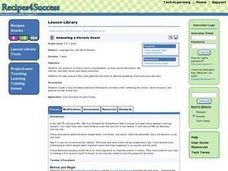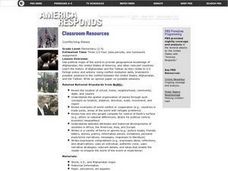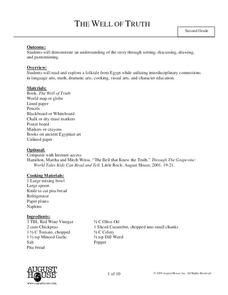Curated OER
Experiencing Japanese Feudalism
Students identify that a system of feudalism similar to that of medieval Europe developed in Japan by 1300. Students identify the social hierarchy of feudal Japan. Students identify what the cultural basis for the relationships among...
Curated OER
Trains, Telegraphs, and Steamships: War’s New Weapons
Students examine the technological weapons of the Civil War. In this Civil War lesson plan, students research the use of trains, telegraphs, and steamships in the war. Students write newspaper articles pertaining to the new weaponry.
Curated OER
A Day in the Life
Students inquire about the politics and culture of Ancient Rome. In this Ancient Rome project/unit, students research life during ancient Roman times and create a newspaper with articles on politics, sports, culture, and economics.
Curated OER
Carnival Celebrations: Masks and Vejigantes
Young scholars explore Carnival. In this Puerto Rico Carnival lesson, students discover the history of the cultural celebration as well as the significance of the elaborate masks worn for the festivities. Young scholars create their own...
Curated OER
Reign of Terror?
Students research acts of terrorism around the world over the past thirty years to create a visual timeline of these events for the classroom.
Curated OER
See You Later, Alligator
Students explore the historical and social significance of animals as cultural symbols in various countries around the world, as well as the impact that humans have made on the population and natural habitats of these animals.
Curated OER
Memorandum Regarding the Enlistment of Navajo Indians
Young scholars examine the Navajo dictionary used by the U.S. military in W.W. II. They role-play Navajo messengers and Marine Corp staff. They research the Battle of Iwo Jima and confirm or discount the claim that Navajos made the...
Curated OER
Animating a Historic Event
Research a historic event using textbooks, primary source documents, the Internet, and other library and media resources. Young historians will take the research they have gathered and write an attention-grabbing, historically accurate...
Curated OER
Conflicting Views
Students complete a Venn diagram comparing the United States and Afghanistan. They research the history of the Taliban and how they relate to the United States and its foreign policy. They write a paper on possible solutions.
Curated OER
Secret Agent Men
What does a secret agent really do? After reading an article, learners discover the connection between intelligence and espionage. Using the Internet, they will research the history and motivations of intelligence agencies throughout the...
Curated OER
Origin of the Modern Olympic Games
Students using a Venn diagram, compare and contrast the modern and ancient Olympic games. They write essays and construct timelines about the games. Students, using various items, create tools for a new Olympic game and write the...
Curated OER
Underground Railroad
Students explore the Underground Railroad. In this U.S. history and technology lesson, students research an assigned topic related to the Underground Railroad, such as "abolitionist," "conductor," or "station houses." Students design a...
Curated OER
The Dawn of Humanity
Students investigate recent archaeological challenges to theories of human origins. They research the history and geography of various African regions to create proposals for future excavations.
Curated OER
Children on the Street
Students explore the causes and effects of child homelessness in Turkey and around the world. They compare the issues surrounding child homelessness in poor and wealthy countries.
Curated OER
D-day Message from General Eisenhower to General Marshall
Students analyze a "top secret" document written by Eisenhower. They identify and chart cliches for those about to go into battle and read related poetry. They invite a veteran to describe the D-Day invasion.
Curated OER
Protecting the Past: Give a Hoot, Don't Loot!
Students, in small groups, simulate an ancient civilization and the art they created, another group represents vandals, and the final group represents archaeologists who try to figure out what life was like for the "ancient peoples". ...
Curated OER
Harlem Renaissance and Toni Morrison's Jazz
Students study the historical time of the Harlem Renaissance, including key events and figures. They read literature that weaves fiction and history and survey some of the references to the Harlem Renaissance in the novel, Jazz, by Toni...
Curated OER
Land of the Rising Guns?
Students discuss the decision after World War II of Japan's to follow a policy of pacifism. After reading an article, they identify the ways Japan is strengthening its military. They watch a video to discover how their Constitution was...
Curated OER
Ways of Thinking
Students explore all the different avenues of the concept of different ways of thinking by involving the views of several great minds of history to thinkers of Western Civilization. They assess questioning, life, work, skepticism,...
Curated OER
Ancient Greece: Athens as a City State
Sixth graders find Greece on the map and recognize how the geography of Greece was important in its development. In this ancient Greece lesson, 6th graders research Greece and compare to the civilization of ancient Egypt. Students answer...
Curated OER
The Well of Truth
Second graders explore the Egyptian folktale, The Well of Truth. In this folktale lesson, 2nd graders read the tale and discuss the events from the text. Students write a diary entry from the point of view of a character in the text....
Curated OER
Social and Cultural Issues in the Civil Rights Movement
Learners watch videos, listen to speeches and analyze the information that is presented about the civil rights movement. They examine visual art of the period.
Curated OER
Asking About Armenia
Students explore the modern history, culture, economy, conflicts, social conditions, and geographical boundaries of Armenia and present their findings to fellow classmates at a teach-in.
Curated OER
Mission Accomplished
Second graders describe the impact of certain figures in United States history, including Meriwether Lewis and William Clark. They describe experiences of early American explorers and compose narratives from the perspectives of others.

























